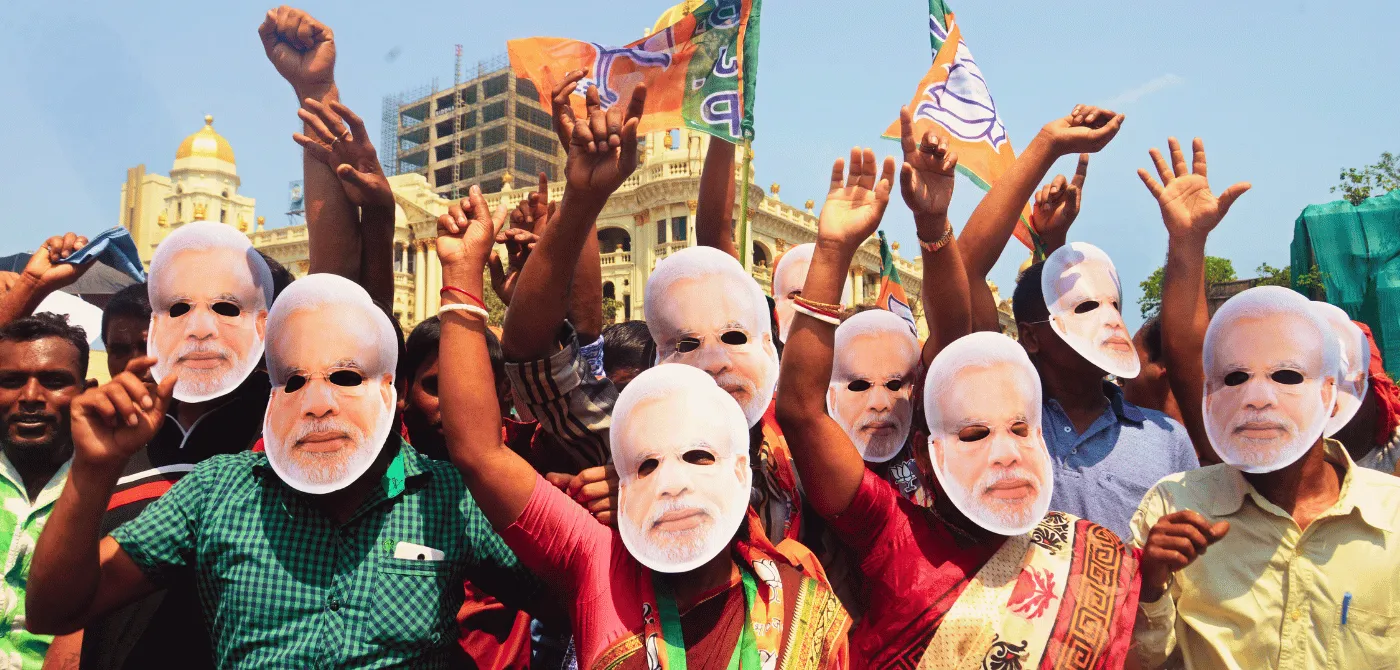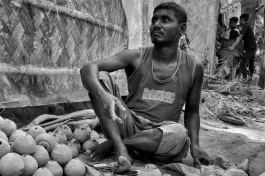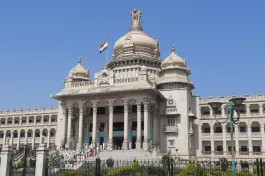After the film The Kashmir Files was released, a friend of more than 20 years fell out with me after I pointed out the movie’s factual inaccuracies and disinformation. For him, I was not just calling out the film’s propaganda but challenging his entire worldview.
Since the election of Narendra Modi in 2014, India is going through an unprecedented phase in its history in which Hindu supremacism has fused with the state. The political and social aspects of this phenomenon have been written upon extensively. Yet, the personal and psychological aspects have not been talked about enough. One cannot understand politics in its entirety without making sense of the psychological.
With the rise of the far-right, the personal has come to the fore. Because it is based, as psychology studies show, on a politics that is more emotional, less given to reason, logic, and facts, and focused on the extreme, especially hatred towards outgroups. This has led to a politics that has convulsed the personal sphere, tearing apart family and friendships. After all, toxicity in politics is bound to polarise human beings at a personal level too.
This polarisation is evident globally, especially in Europe, and in America since the Donald Trump era. In a Reuters/Ipsos poll conducted after Trump won the American presidency in 2016, 16% of the respondents had stopped conversing with a friend or family member. According to Pew research, 80% of Americans have “just a few” or no friends across political divides.
Polarisation has happened because what was ethically proscribed in politics has now become mainstream. As a former Republican Party ideologue put it: “the crackpot outliers of two decades ago have become the vital centre today”.
The energies of those opposed to Hindutva in India have been spent fact-checking the blatant lies that come as a stream of WhatsApp forwards.
This is the case in India as well when centrist politics, which were dominant for nearly 70 years, moved rightward in 2014. Since then, right-wing politics has also taken on fascist hues with an extreme personality cult, the demonisation of religious minorities, relentless propaganda, fake news and the questioning of science.
In this miasma of hate and untruths, those who are centrists, moderates, liberals and the democratic left, are reduced to being pallbearers of facts and civility. For, much of the energies of those opposed to Hindutva in India have been spent fact-checking the blatant lies that come as a stream of WhatsApp forwards on family and friend groups.
The role that these have played in demonising Muslims, even as the cause of a deadly pandemic like the coronavirus has been seen. The emotional wages of not being able to convince a right-wing opponent of even easily verifiable facts, or that there is something morally devastating about the prime minister calling his own citizens “infiltrators” or Home Minister Amit Shah using genocidal language in terming Bangladeshi refugees as “termites” are enormous.
Research in psychology and value surveys have shown that while conservatives and the right-wing favour parochialism and immediate social groups like the family, religion and the nation, liberals favour universalism and expressing moral regard to groups that lie beyond the immediate circle, and to the world at large and humanity.
The emotional wages of not being able to convince a right-wing opponent of even easily verifiable facts […] are enormous.
While the conservatives espouse moral values like loyalty and authority, liberals prefer ones like fairness and freedom. Studies establish that right-wing and conservative ideologies are a good predictor of ethnocentrism and prejudice against minorities who are often seen as a threat to social order.
John T Jost, one of the world’s leading political psychologists, basing himself on a database of over 280 studies consisting of nearly 5,00,000 individual participants, shows the psychological needs and interests that are most commonly correlated with right-wing and conservative ideology: dogmatism, cognitive rigidity, need for order, etc. Here, fear and perceptions of threat play an important role in reaffirming right-wing ideologies.
A survey from 91 countries shows that national external threats and right-wing attitudes are strongly related. As an American journalist described: “Trump is a master of fear, invoking it in concrete and abstract ways, summoning and validating it.” This is the same fear that Modi evokes in his speeches: of the urban Naxal, the anti-national, those who produce more children, and those who will snatch mangalsutras from Hindu women and give them to Muslims, and so on.
Accounts of the rise of the right show how individuals have discovered in their family and friends facets unknown before. As a woman said of her friend during the Trump presidency, “she had crossed over to a side I had never known or seen before.” There is now evidence from academic research about the “emboldening effect” of hate speeches by high-ranking political leaders on ordinary followers expressing openly their prejudices and hate.
While this research is based on the effect caused by just one individual, Trump, imagine the emboldening effect of an entire ecosystem of high offices in India starting from the prime minister making the vilest hate speeches targeting Muslims thus normalising what was considered beyond the pale before.
Democratic consensus further shrinks under the haze of one of the most extreme personality cults in world politics now: that of Modi.
As the Supreme Court observed, “the buck ultimately stops with the government” to come down on hate speech and crimes. Yet, when families and friends justify them through whataboutery even when they involve lynchings, the ethnic violence in Manipur, the Delhi riots in February 2020 and Ram Navami communal conflicts, there is hardly any political meeting ground left.
This meeting ground of democratic consensus further shrinks under the haze of one of the most extreme personality cults in world politics now: that of Modi. The deleterious effects of this on India’s democracy have already been copiously documented.
In a 2023 Pew survey, 85% of Indian respondents opined that rule by an authoritarian leader would be good, the highest percentage amongst 24 countries. What are the psychological states that make ordinary individuals display what psychologist and philosopher Erich Fromm – a German Jew who fled Nazi Germany – terms as the contradiction of “craving for submission [to authority] as well as domination over those who were powerless”?
In his words, the Nazi regime was characterised by “its spirit of blind obedience to a leader and of hatred against racial and political minorities, its craving for conquest and domination [and] its exaltation of the German people.”
Psychological characteristics like self-deception and feelings of powerlessness fuel hyper-nationalism.
Robert Altemeyer’s right-wing authoritarianism scale, demonstrating the affinity between right-wing ideologies and authoritarianism, is the most widely used scientific measurement in authoritarianism. Yet, we also know of the monstrous horrors unleashed by the totalitarianism of Joseph Stalin and Mao Zedong.
As long as politics in a liberal democracy is defined by the extreme, it will continue to tap on and reinforce a psychological state that sees outgroups as evil and dangerous, distrusts people who think differently and is intolerant of dissent. Psychological characteristics like self-deception and feelings of powerlessness fuel hyper-nationalism and the belief amongst 63% of the rich and 71% of those with high media exposure that India has already become a Vishwaguru under Modi, as per the Lokniti-CSDS Survey. While WhatsApp University is mocked, its effects are real in rendering facts irrelevant.
Of course, it is the failures of centrist politics, like the 1975 Emergency, the 1984 Sikh massacre and the grievous neglect of caste and class inequalities that laid the groundwork for the extreme rightward turn. Those who seek to counter this must engage in civil and rational ways with the votaries of such politics, especially in understanding the psychological states they speak to. Yet, they are also confronted by philosopher Karl Popper’s paradox of tolerance: can a tolerant society permit intolerant ideologies in the name of tolerance which will ultimately destroy the tolerant society itself?
Until this paradox is resolved, the politics of religious nationalism and supremacism amidst India’s plurality and diversity will exact a heavy toll, including in the personal sphere.
Nissim Mannathukkaren is with Dalhousie University, Canada.
This article first appeared on Scroll.in.









